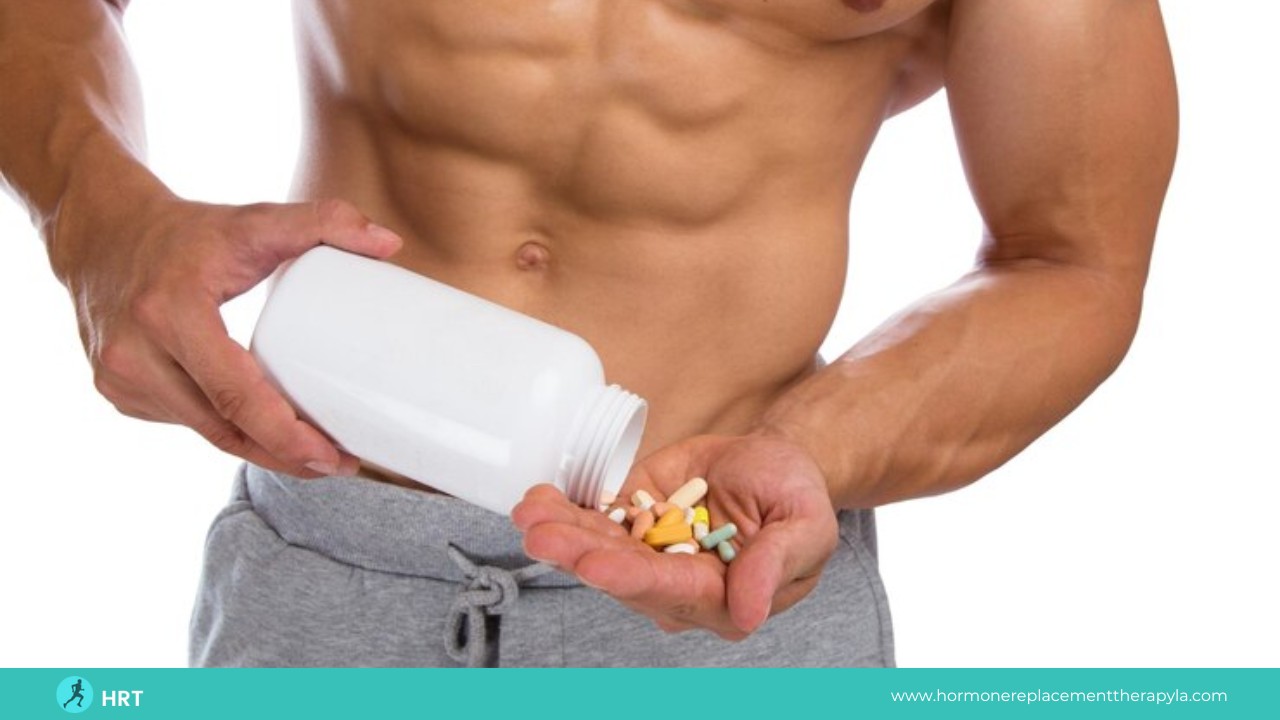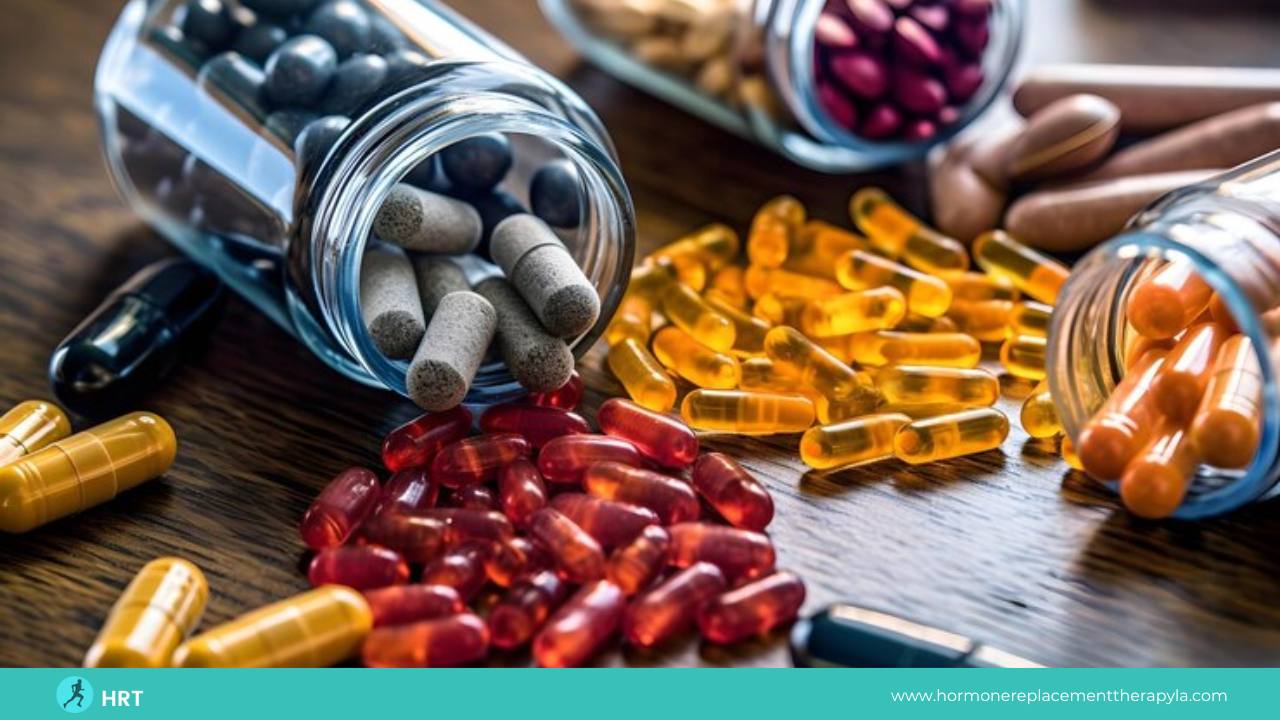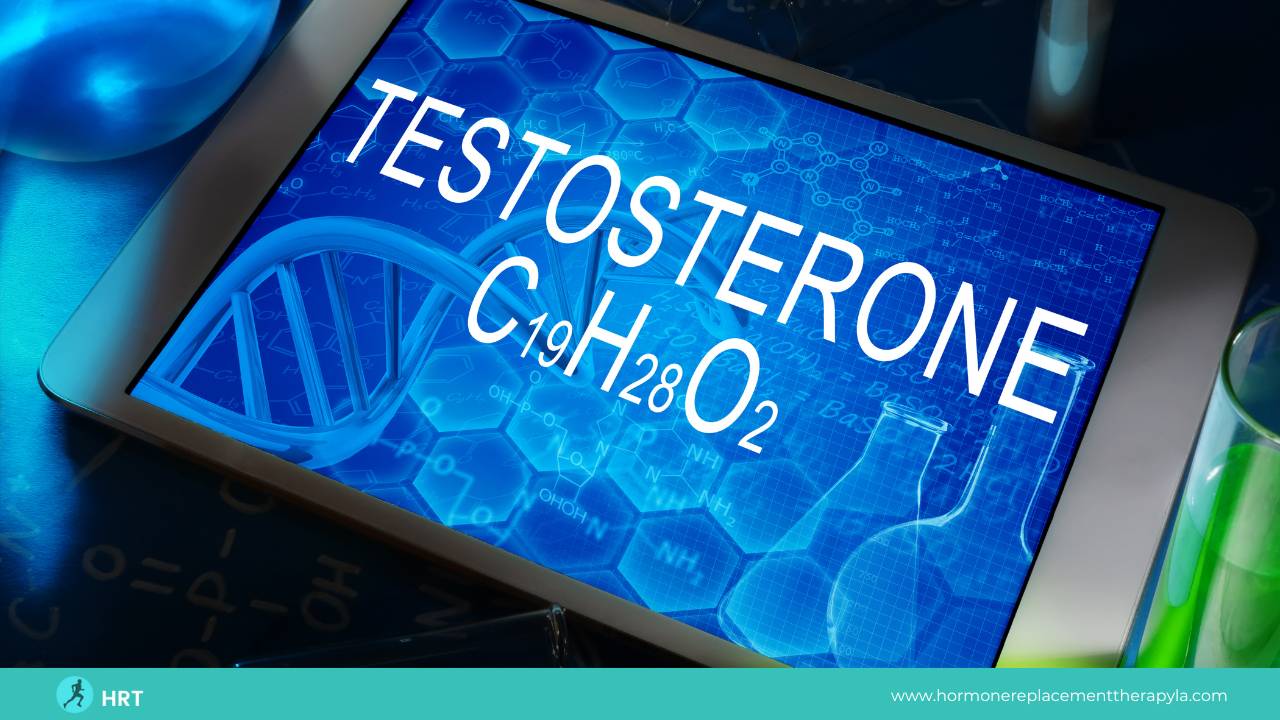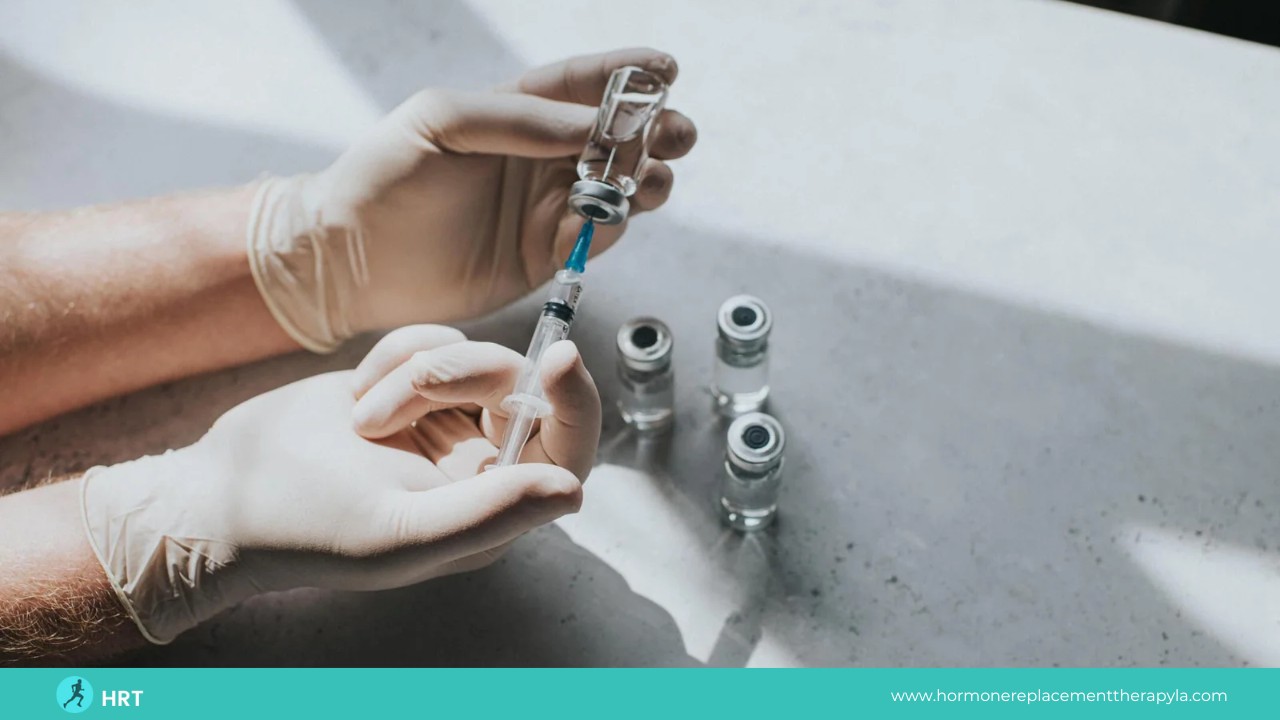One question that frequently emerges is about the role of testosterone boosters in conjunction with HRT. Can these over-the-counter supplements enhance the benefits of prescribed hormone therapies, or do they introduce unnecessary risks and complications?
This enlightening blog post will focus on the impact of testosterone boosters on hormone replacement therapy, exploring potential synergies and pitfalls. From the science behind testosterone’s pivotal roles in the body to expert insights on combining treatments, we aim to provide a comprehensive guide for those considering this path.
Whether you’re seeking to boost energy levels, enhance libido, or improve muscle mass, join us as we unravel the complexities of integrating testosterone boosters with HRT, ensuring you’re informed and prepared to make the best decisions for your health and well-being.
What Are Testosterone Boosters?
Testosterone boosters are dietary supplements designed to increase the body’s testosterone levels naturally.
These products are widely available over the counter and claim to enhance testosterone through various ingredients, including both natural extracts and synthetic compounds. They are marketed primarily toward men seeking to improve their muscle mass, libido, energy levels, and overall sense of vitality.
However, the effectiveness and safety of these supplements can vary, and they are subject to much debate within the medical and fitness communities.
Types of Testosterone Boosters
Testosterone boosters can be categorized into two main types: natural supplements and synthetic products.
- Natural Supplements: These consist of herbs, vitamins, and minerals that are believed to support the body’s natural testosterone production. Common examples include Tribulus Terrestris, fenugreek, D-aspartic acid, zinc, magnesium, and vitamins D and B6. These ingredients are selected based on traditional use or preliminary scientific studies suggesting they might affect hormone regulation.
- Synthetic Products: Synthetic testosterone boosters may contain lab-created compounds designed to mimic or stimulate the body’s hormonal production processes. While less common than natural supplements, these products often claim to offer more potent effects.
Common Ingredients and Their Claimed Effects
- D-Aspartic Acid: An amino acid claimed to increase luteinizing hormone, which signals the testes to produce more testosterone. Studies on its effectiveness have shown mixed results.
- Tribulus Terrestris: A herb used in traditional medicine for centuries, believed to boost libido and testosterone levels, although scientific evidence supporting its effectiveness is limited.
- Fenugreek: Often claimed to improve sexual function and increase testosterone levels. Some studies suggest it may have a modest effect on enhancing libido and body strength.
- Zinc and Magnesium: Essential minerals for hormone production. Zinc, in particular, plays a critical role in the synthesis of testosterone. Deficiencies in zinc and magnesium have been linked to lower testosterone levels.
- Vitamin D: Dubbed the “sunshine vitamin,” its levels in the body have been correlated with testosterone levels. Supplementation may benefit those with low exposure to sunlight and, subsequently, low vitamin D levels.
- Ashwagandha: An adaptogen that increases testosterone levels, reduces cortisol (the stress hormone), and improves overall fertility in men. Some research supports its use for improving semen quality and hormone balance.
Evaluating the Claims
While testosterone boosters contain ingredients with some scientific backing, it’s important to note that the effects can vary widely among individuals.
Many of the studies on these supplements are small in scale, short, or have found only modest effects. Moreover, the supplement industry is less regulated than pharmaceuticals, leading to potential product quality and ingredient concentration variability.
The effectiveness of testosterone boosters often depends on the individual’s current health status, dietary habits, and whether they have any underlying conditions that might affect testosterone levels.
For some, these supplements may offer a slight improvement in symptoms associated with low testosterone, while for others, they may not have a significant impact.
Potential Benefits of Testosterone Boosters in Hormone Replacement Therapy (HRT)
The integration of testosterone boosters into a hormone replacement therapy (HRT) regimen is a subject of interest for many seeking to optimize their hormonal health.
The rationale behind incorporating these boosters is often to enhance the effects of HRT, particularly in areas such as energy levels, libido, and muscle mass, which are directly influenced by testosterone levels.
Below, we explore the potential benefits of this approach, along with any supporting research and clinical findings.
Enhancing Energy Levels
One of the primary reasons individuals seek HRT, especially testosterone replacement therapy (TRT), is to combat fatigue and low energy levels associated with hormonal imbalances.
Testosterone boosters are purported to further enhance energy levels by supporting the body’s natural testosterone production. Some ingredients in testosterone boosters, such as vitamin D and magnesium, have been linked to improved energy metabolism and reduced fatigue in deficient populations.
Boosting Libido
Testosterone plays a crucial role in sexual desire and function.
Both men and women undergoing HRT for low testosterone levels may seek additional improvements in libido through testosterone boosters. Ingredients like Tribulus Terrestris and fenugreek have been traditionally used and studied for their potential to enhance sexual function.
Although evidence is mixed, some studies suggest that certain natural supplements can contribute to modest improvements in sexual desire and arousal.
Increasing Muscle Mass
Testosterone is essential for muscle growth and maintenance. Individuals on HRT often experience improvements in muscle mass and strength, and those looking to maximize these benefits may turn to testosterone boosters.
D-Aspartic acid, for example, has been studied for its role in increasing muscle mass and strength in conjunction with exercise, though results have been inconsistent across studies.
Supporting Research and Clinical Findings
While the idea of combining testosterone boosters with HRT is appealing for its potential to amplify benefits, scientific evidence supporting this practice is limited and varies by the specific booster and its ingredients.
Some studies have found positive effects on testosterone levels and related outcomes with the use of certain supplements:
- Vitamin D Supplementation: Research has shown that vitamin D supplementation can increase testosterone levels in men with low vitamin D and testosterone levels, suggesting a potential complementary role in HRT.
- Zinc: A zinc deficiency has been linked to low testosterone levels. Supplementation in zinc-deficient individuals can help restore testosterone levels, potentially enhancing the effects of HRT.
- Ashwagandha: Limited studies suggest that ashwagandha may improve testosterone levels and reproductive health in men, indicating a possible adjunctive benefit to HRT.
It’s important to note that most of these studies involve supplements as standalone treatments rather than in combination with HRT. The evidence for a synergistic effect when used alongside HRT is mainly anecdotal or based on the individual effects of these supplements.
Risks and Interferences with Hormone Replacement Therapy (HRT)
While testosterone boosters might offer potential benefits when used alongside hormone replacement therapy (HRT), it’s crucial to consider the risks and possible interferences they may pose.
The allure of over-the-counter (OTC) supplements to enhance HRT effects can lead to unintended consequences, impacting hormonal balance, treatment efficacy, and overall health.
Potential Risks of Using Testosterone Boosters
- Side Effects and Health Concerns: OTC testosterone boosters, despite their natural ingredient labels, are not without side effects. Common adverse effects can include acne, sleep disturbances, mood swings, and increased aggression. More severe health risks are associated with long-term use or high doses, such as liver damage, heart problems, and an increased risk of blood clots. These side effects are particularly concerning for individuals with pre-existing health conditions.
- Hormonal Imbalance: Testosterone boosters can disrupt the body’s natural hormone regulation, leading to an imbalance. For individuals undergoing HRT, this imbalance can counteract the carefully calibrated effects of prescribed hormone therapies, potentially leading to suboptimal treatment outcomes or worsening of symptoms.
- Absorption and Metabolism Interference: Some ingredients in testosterone boosters may interfere with the absorption and metabolism of prescribed hormones. For example, certain supplements can affect liver enzymes responsible for metabolizing hormonal medications, altering their effectiveness and potentially leading to incorrect hormone levels.
Expert Opinions and Guidelines
Endocrinologists and hormone therapy specialists caution against the unsupervised use of testosterone boosters alongside HRT.
They emphasize the importance of maintaining a controlled and monitored hormonal environment, especially when treating hormone deficiencies or imbalances. The introduction of OTC supplements without professional guidance can complicate treatment plans and outcomes.
Experts recommend thorough evaluation and monitoring when considering any additions to HRT regimens, including:
- Baseline Hormone Assessments: Before starting any supplement, baseline hormone levels should be measured to understand the individual’s hormonal health landscape.
- Ongoing Monitoring: Regular follow-ups and hormone level checks are crucial to assess the impact of any supplement on HRT efficacy and adjust treatment plans as necessary.
- Individualized Treatment Plans: Recognizing each patient’s unique hormonal profiles and health conditions, treatments should be personalized. What works for one individual may not be suitable for another.
Clinical Guidelines
While there are no universal guidelines for combining testosterone boosters with HRT, clinical practice tends toward caution. The Endocrine Society and other professional medical organizations often advise against the use of unapproved supplements as adjuncts to hormone therapy due to the lack of comprehensive safety and efficacy data.
Key Considerations Before Combining Treatments

The decision to supplement hormone replacement therapy (HRT) with over-the-counter testosterone boosters requires careful consideration and a thorough understanding of various factors.
Individuals contemplating this combination should evaluate the potential benefits against the risks and consult with healthcare professionals. Here are essential considerations to weigh before integrating testosterone boosters into an HRT regimen.
Existing Health Conditions
Before adding testosterone boosters to HRT, it’s crucial to assess any existing health conditions. Specific medical issues, such as heart disease, liver problems, kidney dysfunction, or a history of blood clots, can be exacerbated by additional testosterone, whether from HRT or supplements.
The presence of these conditions may increase the risk of side effects and influence the overall safety and efficacy of combining treatments.
Specific Goals of HRT
Understanding the primary objectives of undergoing HRT is vital. Whether the goals are to alleviate symptoms of testosterone deficiency, improve quality of life, address specific health concerns like osteoporosis, or manage conditions related to menopause or andropause, the addition of testosterone boosters should align with these objectives.
Misalignment can lead to counterproductive outcomes, potentially derailing progress toward these goals.
Potential Interactions with Other Medications
Testosterone boosters can interact with prescription medications, including those used in HRT. These interactions can alter the effectiveness of medications, leading to either heightened effects, reduced efficacy, or unexpected side effects.
For example, certain supplements may influence the metabolism of drugs through the liver, affecting how quickly or effectively the body processes a medication. Discussing current medications with a healthcare provider ensures a comprehensive review of potential interactions.
Hormonal Balance and Monitoring
Adding testosterone boosters to an established HRT regimen can affect the delicate hormonal balance achieved through prescribed treatment. It’s essential to monitor hormonal levels closely when combining treatments to avoid imbalances that could lead to symptoms like mood swings, acne, or more severe health concerns.
Regular monitoring through blood tests and consultations with a healthcare provider can help manage these risks.
Quality and Regulation of Supplements
The quality and contents of over-the-counter testosterone boosters can vary significantly. Unlike prescription medications, the supplement industry is less rigorously regulated, leading to potential discrepancies between listed and actual ingredients or concentrations.
Opting for reputable brands and seeking products that have been third-party tested can mitigate some of these risks.
Professional Guidance
The most critical consideration is consulting with a healthcare professional, particularly one specializing in hormone therapy. A specialist can provide personalized advice based on an individual’s health history, current treatment plan, and specific health goals.
This guidance is invaluable in navigating the complexities of combining treatments and ensuring that any additions to HRT are made safely and effectively.





